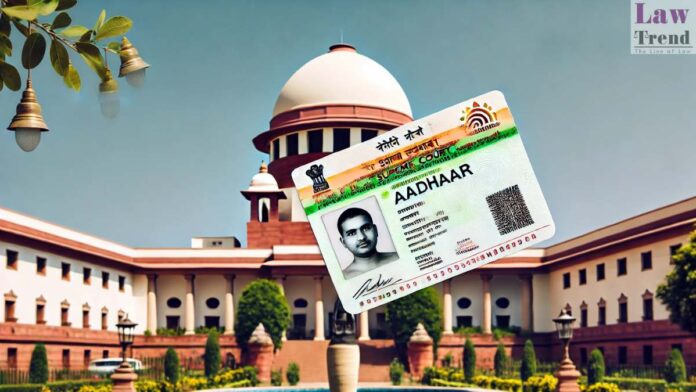The Supreme Court on Monday directed the Election Commission of India (ECI) to treat Aadhaar as the twelfth valid document for inclusion in Bihar’s electoral rolls during the ongoing special intensive revision (SIR). The order came amid complaints that field officials were rejecting Aadhaar despite earlier judicial directions.
A bench of Justices Surya Kant and Joymalya Bagchi clarified that while Aadhaar cannot serve as proof of citizenship, it remains a valid document to establish identity and residence.
“The Aadhaar card shall be treated as the 12th document by the ECI. However, it is open for the authorities to examine its genuineness. Aadhaar will not be treated as a proof of citizenship,” the bench directed, asking the poll body to issue instructions “during the course of the day.”
The ruling came after sharp exchanges in court. Senior advocate Kapil Sibal, representing the Rashtriya Janata Dal (RJD), alleged that electoral officials were penalising booth-level officers (BLOs) for accepting Aadhaar. He argued that the rejection of Aadhaar undermined the inclusivity of the revision exercise.
ECI’s counsel, senior advocate Rakesh Dwivedi, insisted that Aadhaar was already being accepted but reiterated that it could not establish citizenship. He warned against “over-inclusivity” and argued that the Commission was constitutionally empowered to assess citizenship issues while preparing rolls.
The bench, however, questioned why ECI’s field instructions only mentioned 11 documents despite prior court orders. Justice Bagchi observed that while Aadhaar cannot prove citizenship, it has statutory value as a proof of identity under the Representation of the People Act.
Opposition Allegations and Political Fallout
The controversy stems from the ongoing revision in Bihar, where nearly 6.5 million names were excluded from the draft rolls. Opposition parties, led by RJD, allege that the exercise risks disenfranchising genuine voters through technical hurdles and arbitrary exclusions.
On September 1, the apex court had already directed the ECI to accept claims and objections beyond statutory deadlines and to deploy para-legal volunteers to assist voters online. Persistent confusion over Aadhaar’s status forced Monday’s explicit order.
The SIR has become a flashpoint ahead of the Bihar assembly elections later this year. Eight Opposition parties, including Congress, RJD, Samajwadi Party, DMK, Trinamool Congress, and Shiv Sena (UBT), have called the revision “unprecedented” and warned it may be replicated nationally.
Union Home Minister Amit Shah, however, defended the process, saying at a Sitamarhi rally last month that the Opposition was opposing SIR only because “infiltrators” were being removed from rolls.
In its ruling, the Supreme Court struck a balance, ensuring inclusivity while preventing misuse.
“Genuine citizens are entitled to be included in the rolls, while those claiming citizenship on the basis of forged or sham documents must be kept out. Aadhaar can be the 12th document, subject to verification under the law,” the bench said.




